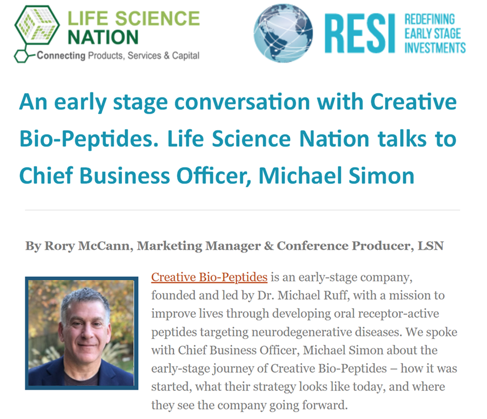Synapse loss is the principal cause of cognitive decline in Alzheimer’s disease (AD) and related disorders ( LBD, ADRD). Many, if not all patients experience a “mixed-dementia”, caused by multiple toxic oligomers such as amyloid beta, tau, and alpha-synuclein in the brain, but also now being documented throughout the body. These individuals experience an accelerated disease. The first study [Kuhn, 2024] reports that RAP-103, a CCR5 antagonist, at exceedingly low concentrations, prevents amyloid beta destruction of synapses in cultured rodent and human neurons. A further study [Liz, 2024] showed that RAP-103 blocks the effects of alpha-synuclein on hippocampal neurons, spines, and synapses via CCR5 dependent pathways. These effects, if translated to people, are expected to slow, prevent, even reverse cognitive decline in multiple dementias, especially those with significant mixed etiologies.
Uncategorised
RAP-103 Inhibits Opioid-derived Dependence, Withdrawal and Respiratory Depression
Creative Bio-Peptides, Inc, a preclinical-stage biotechnology company developing novel therapies to balance the innate immune system and promote regeneration of damaged neurons, today announced the publication of findings from a preclinical study showing that treatment with the multi-chemokine receptor antagonist oral peptide RAP-103 substantially reduced heroin self-administration and motivation to consume heroin. RAP-103 also reduced the severity of naloxone-precipitated withdrawal responses in morphine dependence, as well as morphine-induced respiratory depression. In addition, RAP-103 normalized the components of addiction chemistry in the brain that are altered by opioid abuse.
These data were published online ahead of print in the September 2022 issue of the peer-reviewed scientific journal Drug and Alcohol Dependence.
“In collaboration with The Center for Substance Abuse Research at Temple University, the team at Creative Bio-Peptides has uncovered a potential non-opioid treatment to reduce the desire to consume opioids and to limit opioid withdrawal and respiratory depression,” said Michael Ruff, PhD, President and CEO of Creative Bio-Peptides.
The results identify chemokine receptor antagonist RAP-103 as a potential treatment to enhance opioid analgesia and inhibit opioid-derived dependence, withdrawal and respiratory depression. Chemokines are small peptide hormones of the innate immune system that regulate inflammation, pain and substance abuse. In recent years, research has demonstrated that chemokine-opioid crosstalk is a physiological crossroads for influencing therapeutic and adverse effects of opioids. Activated chemokine receptors, especially CCR2, CCR5 and CXCR4, can control the body’s opioid receptors to increase pain states by reducing opioid-induced analgesia via desensitization of OPRM1 receptors. In studies funded by the National Institutes of Health’s (NIH) HEAL Initiative and the National Institute on Drug Abuse, conducted at The Center for Substance Abuse Research at the Lewis Katz School of Medicine at Temple University, the possible therapeutic use of RAP-103, an orally active small molecule that blocks these multiple chemokine receptors active in pain, was evaluated for its effects to reduce opioid administration, motivation to consume opioids, opioid withdrawal symptoms and opioid respiratory depression.
“Chemokine receptor antagonism, with compounds such as RAP-103, has high potential as a pharmacotherapy because blocking specific cell surface receptors with small molecules (called antagonists) is a cornerstone goal of the biopharmaceutical industry,” said Scott Rawls, PhD, the study’s principal investigator, and Professor, Department of Neural Sciences, Center for Substance Abuse Research, Lewis Katz School of Medicine, Temple University.
About the Study
The study was designed to examine the potential medically assisted treatment (MAT) capabilities for opioid use disorder (OUD) with RAP-103, a small orally stable chemokine receptor antagonist peptide that blocks opioid acquisition, maintenance, and withdrawal. In the study, researchers conducted tests of animal self-administration, the gold standard for evaluating abuse liability of drugs. In self-administration experiments, RAP-103 reduced heroin intake and reinforced strength. Daily administration of RAP-103 delayed the onset, and reduced the magnitude, of heroin self-administration. In other experiments, RAP-103 greatly reduced the motivation to maintain opioid use.
Other adverse effects of opioids blocked by RAP-103 included the severity of morphine physical dependence and respiratory depression. The behavioral effects of RAP-103 were associated with changes in mesolimbic brain regions known to play a role in dopamine transmission and substance abuse.
In additional current studies, the objective is to further demonstrate the feasibility of RAP-103 as a MAT agent and to achieve results to support progressing to clinical trials. The goal is to identify the optimized lowest dose at which RAP-103 mitigates opioid self-administration in progressive-ratio experiments. In view of the unique mechanism of RAP-103 action via chemokine receptor antagonism, researchers will identify chemokine and cytokine changes in mesolimbic (ventral tegmental area and nucleus accumbens) brain reward areas to provide a mechanism for how RAP-103 may mitigate the rewarding effects of opioids and other drugs of abuse.
RAP-103 Benefits in Pain Published
Preclinical Data Demonstrate Potential of Creative Bio-Peptides’ Multi-Chemokine Receptor Antagonist RAP-103 to Provide Opioid Sparing Post-Surgical Pain Relief and Treatment for Chronic Pain
Rockville, MD, July 14, 2022 — Creative Bio-Peptides, Inc, a preclinical-stage biotechnology company developing novel therapies to balance the innate immune system and promote regeneration of damaged neurons, today announced the publication of findings from a preclinical study showing that treatment with the small oral peptide chemokine receptor antagonist RAP-103 reduced the amount of opioid needed after surgery by 50% and reversed chronic neuropathic pain caused by diabetes, the most common chronic pain condition, affecting nearly half of diabetics (1).
These data were published online on July 9 ahead of print in the peer-reviewed scientific journal Life Sciences.
“In collaboration with The Center for Substance Abuse Research at Temple University, and the Alan Edwards Centre for Research on Pain at McGill University, the team at Creative Bio-Peptides has uncovered a potential opioid sparing treatment in acute pain and new non-opioid pain reliever for neuropathic pain conditions”, said Michael Ruff, PhD, President and CEO of Creative Bio-Peptides.
Inflammation sits at the crossroads of persistent pain and the opioid crisis. RAP-103 balances the inflammatory response by blocking several small peptide hormones of the innate immune system called chemokines, resulting in less pain, neuronal regeneration, and reduced opioid use. The results identify chemokine receptor antagonist RAP-103 as a potential treatment to reduce post-surgical acute pain in the presence of an opioid and as a non-opioid treatment for chronic pain conditions, including diabetic peripheral neuropathy (DPN) and persistent post-surgical pain (PPSP).
About the Study
Proinflammatory chemokines produced by an innate immune response to injury are key components in both the development and maintenance of pain states. Both the initial neuroinflammatory response to nerve damage and the subsequent immune responses that evolve over days to weeks contribute as much to the development and maintenance of chronic neuropathic pain conditions as the initial injury itself. Chemokines that facilitate a protective response to acute tissue injury can become causes of chronic pain and understanding the dysregulated innate immune response to initial tissue damage that drives the conversion to chronic pain is a topic of current pain treatment research focus.
Studies that led to the publication of this paper had revealed that chemokine-opioid receptor crosstalk can be exploited to influence the therapeutic and adverse effects of opioids. Activated chemokine receptors, especially CCR2, CCR5 and CXCR4, can increase pain by acting on opioid receptors to reduce their effectiveness, a process called desensitization. “Although opioids are widely prescribed for pain, in many circumstances, they have only modest efficacy. The present study shows that inhibition of chemokines can augment the potency of morphine and reduce the doses required for the same analgesic effect. Thus, opioid related side effects in the treatment of pain will be reduced as well” said Saadet Inan, PhD, a study author and Senior Scientist, Department of Neural Sciences, Center for Substance Abuse Research, Lewis Katz School of Medicine, Temple University.
Funded in part by the National Institutes of Health’s (NIH) HEAL Initiative and the National Institute of Neurological Disorders and Stroke, the studies were designed to examine both the ability of RAP-103 to reduce the amount of an opioid needed to manage pain after surgery (where opioids are commonly used) and to assess, using a streptozotocin-induced pain model of diabetic peripheral neuropathy (DPN), its ability to block DPN, a chronic pain condition in which opioids often do not work, or can even enhance pain.
“Peripheral neuropathic pain, whether the result of surgery or disease, is characterized by an unbalanced pro-inflammatory vs anti-inflammatory profile. Potential therapies, like RAP-103, that modulate key inflammatory pathways, e.g., cytokines and chemokines, may influence the trajectories of complex and elusive chronic pain disorders”, said Ji Zhang, MD, PhD, a senior study investigator and Professor, Alan Edwards Centre for Research on Pain, McGill University, Montreal, Canada.
RAP-103 is not an opioid and did not have a direct pain benefit by itself in acute pain but did have the predicted effect to increase the action of an opioid, in this case morphine, to deliver a greater anti-pain benefit with 2-fold less opioid needed. In a test of RAP-103 effect in diabetic neuropathy, a chronic pain condition, RAP-103 by itself alleviated pain nociception by lowering the innate immune response in peripheral nerves.
Creative Bio-Peptides is examining RAP-103’s safety and effects in other poorly treated chronic pain conditions which occur with use of chemotherapies or persistent pain after surgeries with the objective of progressing to clinical trials.
About Creative Bio-Peptides (CBP) CBP was started in 2017 with the mission to improve patients’ lives by challenging prevalent conventions about the causes and treatment approaches of neurodegenerative diseases, and to bring to market innovative therapeutics for important conditions caused by innate immune system activation in persistent post-surgical pain, dementias, and opioid use disorder. RAP-103, the company’s new oral lead peptide, is based on the first generation non-oral DAPTA (Peptide T), which was safe and effective in multiple controlled trials for improving cognitive endpoints (2, 3, 4). RAP-103 is well tolerated in preclinical safety studies with rapid brain entry and stability.
BioHealth Innovation Press Release Features Creative Bio-Peptides
A Conversation with CBO Michael Simon
NIH SBIR AWARD FOR SYNAPSE PROTECTING TREATMENTS FOR ALZHEIMER’S DISEASE
Creative Bio-Peptides, Inc has been funded by the National Institute on Aging (NIA) as part of NIH’s strategic plan to support the development of innovative strategies and therapies to treat Alzheimer’s Disease (AD). Our program “Development of a Novel Chemokine Receptor Antagonist Peptide as a Synapse Protecting Treatment for Neurodegeneration n Alzheimer’s Disease” is supported by a Small Business Innovation Research (SBIR) grant. We are joined in this effort by researchers from Colorado State University and UCLA.
Cognitive impairment in Alzheimer’s or Parkinson’s Diseases, as well as after brain injury, results from loss of neuronal spines and dendrites, preceding and independent of neuronal death. Neuoinflammation via innate immune and microglial processes cause neurodegeneration and loss of function. Creative Bio-Peptides will develop the oral CCR5 chemokine receptor antagonist peptide R103 to prevent, even reverse, synapse loss and neurodegeneration relevant to AD by determining the ability of R103 to preserve dendritic spines and protect synapse function in AD relevant tests . As a bridge to human clinical trials, will perform quantitative PET assessment of R103 inhibition of brain neuroinflammation as a translational target for human studies of R103 in dementias. The chemokine receptor CCR5 has recently been shown to be a translational target for recovery after TBI and stroke and by virtue of its ability to regenerate lost synapses (see Joy et al, 2019). The clinical (non-oral) analog of R103 was the octapeptide DAPTA, also called “Peptide T”, which restored cognitive function in multiple phase 2 clinical trials supported by the NIH, and normalized functional brain scans in Neuro-AIDS, by synapse regenerating mechanisms related to suppressing microglial activation and neuroinflammation. We expect to document synapse regenerating effects of R103 (also called “RAP-103”, receptor-active peptide) as a novel approach to treating AD with the potential to reverse, not merely slow, cognitive decline, as well as chronic pain caused by nerve damage in neuropathies caused by diabetes, nerve injury, or chemotherapy.


